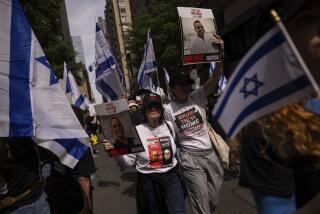Hong Kong Remembers Tiananmen With a Plea for Chinese Democracy
- Share via
HONG KONG — Tens of thousands of demonstrators crowded into a Hong Kong park Friday to commemorate the 15th anniversary of the Tiananmen Square massacre with a candlelight vigil, songs and exhortations to build a democratic China.
Organizers said 82,000 people attended the event, while police put the number at closer to 50,000. Whatever its size, the crowd, which included many families and young people, stretched the entire quarter-mile length of Hong Kong’s Victoria Park.
In Beijing, police equipped with metal detectors and nightsticks guarded every entrance to the Chinese capital’s main square, but the number of visitors was lighter than usual because of intermittent drizzle throughout the day.
No violence was reported in either city.
Most of those who gathered in Hong Kong sat quietly in neat rows, holding white candles as they listened to videotaped speeches by former mainland protest leaders and local politicians urging them to defend democracy.
The June 4 vigil is an annual ritual in Hong Kong, when thousands of the territory’s residents mourn those who died when the military crushed a nascent pro-democracy movement in Tiananmen Square in 1989. However, those who come regularly said this remembrance was by far the largest of recent years.
A large number of younger Hong Kong residents were there for the first time, or were attending again after having skipped the last few commemorations. Many expressed concern that the democratic freedoms they have enjoyed under the terms of the territory’s 1997 transfer from British control to Chinese rule were now under threat.
“If people stay silent, we may lose the right to come here,” said Paul Yan, a 31-year-old music producer who said he was attending the vigil for the first time in more than a decade.
Several mainland Chinese, now able to visit Hong Kong as individuals rather than as part of a tour, also attended.
“Fabulous,” summed up James Yang, 32, of the eastern city of Wuxi. “It’s just wonderful. I’ll tell my relatives and friends once I get back, and they will tell others too, I’m sure.”
Hong Kong legislator Lee Cheuk-yan told the crowd, “This year in Hong Kong, the sky is getting cloudier.”
Lee, deputy chairman of the Hong Kong Alliance in Support of the Patriotic Democratic Movement in China, warned that Beijing was likely to increase pressure on those pushing for fully democratic elections in the territory.
“We are ready to brace for this storm,” he said.
Lee and other speakers urged residents to participate in a pro-democracy march in Hong Kong planned for July 1, the seventh anniversary of the territory’s return to Chinese sovereignty.
In April, China’s National People’s Congress preempted a campaign by democracy advocates for the direct election of Hong Kong’s chief executive in 2007, and for all 60 members of the legislature to be elected in that way by the following year. Three popular and outspoken radio talk show hosts quit last month, all of them saying they had felt intimidated politically.
Several former student leaders of the Tiananmen protests, who are banned from returning to China, made public statements Friday, either in videotaped messages played at the vigil in Hong Kong or in speeches elsewhere. In Washington, Wuer Kaixi said that as long as Chinese leaders faced pressure for reform, they would have to increase democracy.
“We can’t afford not to be optimistic,” said Wuer, who lives in Taiwan.
In Beijing, police vans, undercover police cars and buses were parked around Tiananmen Square. Plainclothes and uniformed officers crisscrossed the square, stopping anyone they deemed suspicious.
Associated Press reported that at least 16 people were detained. Extensive surveillance was evident around the country in advance of the anniversary.
For most of those who came to visit the symbolic heart of China, however, it was just another day.
“So today is June 4,” said Guo Qingshuang, 20, a travel agent working in Beijing, as she sat holding a rolled-up newspaper in Tiananmen Square. “I’ve heard about the date, but I’m not sure why it’s important. It’s probably in some history book I’ve forgotten.”
As she spoke, five rows of People’s Liberation Army soldiers marched by, three abreast, as a fire engine with a water jet stood ready, presumably for crowd control, because almost nothing in the vast square is flammable.
Marshall reported from Hong Kong and Magnier from Beijing. Special correspondent Tsai Ting-I in Taipei, Taiwan, and researcher Tammy Wong in Hong Kong contributed to this report.
More to Read
Sign up for Essential California
The most important California stories and recommendations in your inbox every morning.
You may occasionally receive promotional content from the Los Angeles Times.













